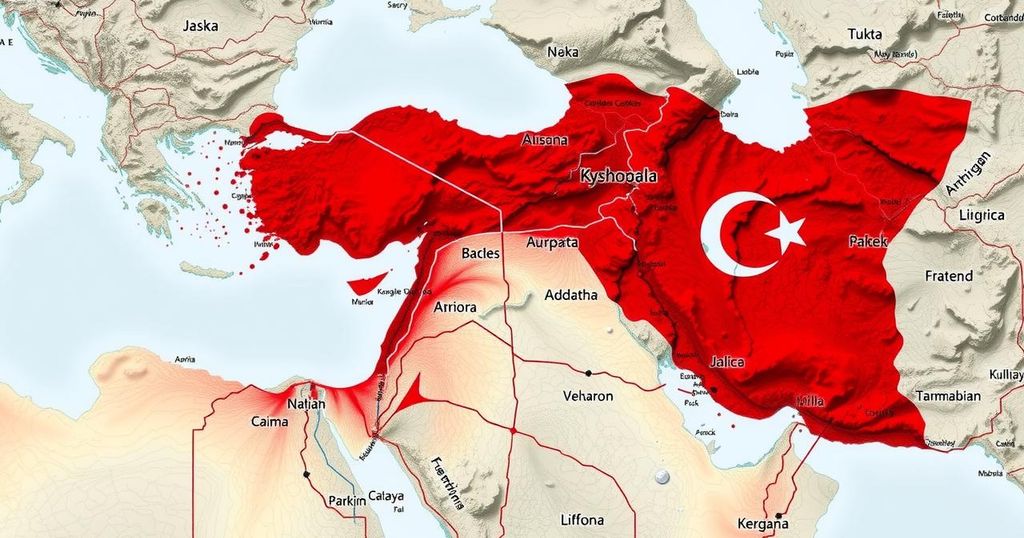Turkey’s Strategic Gains Amidst Assad’s Ouster: A New Regional Dynamics Examination

The ousting of Bashar al-Assad from power has heightened Turkey’s regional influence while presenting new challenges for President Recep Tayyip Erdogan. Turkey has sought to expand its control over Kurdish populations and cope with the Syrian refugee crisis, amid evolving relationships with key players like Russia. Turkey’s strategic response will depend on the evolving situation within Syria and the stance of its new government.
The recent overthrow of Bashar al-Assad in Syria marks a significant shift in the regional power dynamics, potentially elevating Turkey’s influence amidst new challenges for President Recep Tayyip Erdogan. As Turkey’s opposition forces, backed by Erdogan, surged towards Damascus, a delicate balance of power has emerged. Erdogan’s proposition to collaborate with Assad went unheeded, hence sealing the latter’s fate, while Turkey’s strategic interests in curbing Kurdish influence grow. With a longstanding presence of approximately 15,000 troops in Idlib province, Turkey’s involvement was evidently tacit, operating alongside factions like Hayat Tahrir al-Sham (HTS).
Amidst mounting regional uncertainty, Turkey seeks to solidify its borders, particularly concerning the Kurdish People’s Protection Units (YPG), which Ankara views as allied with the Kurdistan Workers’ Party (PKK) designated as a terrorist entity. Recent military operations have allowed Turkey-backed forces to seize control of locations such as Manbij, enhancing Erdogan’s strategic foothold. As this volatile scenario unfolds, Turkish ambitions may be tempered by the potential stances of the incoming Damascus government.
The refugee situation remains critical, with over three million Syrians currently residing in Turkey. Erdogan’s bid to repatriate some of these refugees faces numerous challenges, including the reluctance of many individuals to return in the absence of stability. Although some may choose to go back, a significant contingent is expected to remain in Turkey, now established in their host nation. Furthermore, relations with Russia could evolve as Turkish and Russian interests align, particularly regarding military presence and the future of Syrian governance.
In summary, while Turkey emerges as a pivotal player following Assad’s ousting, the enduring implications for regional governance and Kurdish autonomy remain unresolved, dependent on the forthcoming Syrian leadership’s approach.
The geopolitical landscape of the Middle East has been profoundly influenced by the Syrian civil war, particularly reflecting Turkey’s strategic aspirations under President Recep Tayyip Erdogan. With Syria’s civil unrest providing fertile ground for various rebel factions, Turkey has sought to assert its influence by backing opposition groups, engaging directly in military operations, and modifying its relations with both regional adversaries and allies, notably Russia. The fall of Assad has created not only opportunities but also substantial risks for Turkey’s regional aspirations, necessitating a thorough understanding of its historical context and current political complexities. Erdogan’s focus on national security has chiefly manifested in controlling the Kurdish population along the Syrian-Turkish border, given the PKK’s designation as a terrorist organization by Turkey and its allies. Additionally, the refugee crisis stemming from the ongoing conflict has emerged as a crucial domestic issue, influencing Erdogan’s political strategies as he navigates a turbulent international landscape while addressing pressing refugee concerns. The emergence of HTS and other militant groups further complicates Turkey’s strategy, demanding a careful navigation of alliances and opposition to secure its borders and influence regional stability.
In conclusion, the recent changes in Syrian governance have significantly elevated Turkey’s strategic importance in the region, placing it at the forefront of potential developments following Assad’s removal. Erdogan’s dual focus on countering Kurdish influence and managing the refugee crisis will likely dictate Turkey’s actions in the near future. As the situation unfolds, regional dynamics will depend heavily on the responses from the new Syrian leadership and the broader implications for relations with Turkey’s allies, especially Russia. Ultimately, Turkey’s role as a pivotal player reminds observers that it cannot be overlooked amidst the shifting alliances and power struggles characterizing the current geopolitical climate.
Original Source: www.france24.com








